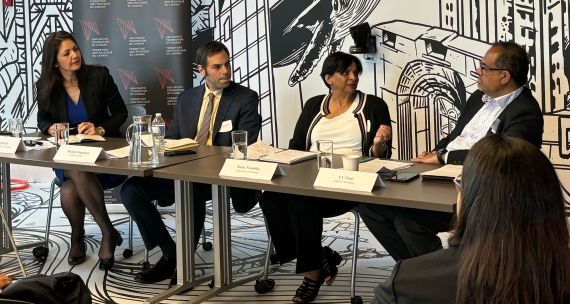 In 2013, Leon Lu founded his seafood company, SeaAlliance, with its flagship “O2O” – online-to-offline – delivery service and FreshOTO online community. Although established in Vancouver, SeaAlliance and FreshOTO were inspired by two Chinese phenomena: the implementation of the “Internet Plus” action plan by China’s central government to promote innovation and galvanize the economy, and the increasing awareness and concern regarding food safety among Chinese consumers. It was in the convergence of these two seemingly unrelated and contextually specific Chinese realities that Leon saw the potential for a new transnational business venture. More importantly, looking at Canada’s exceptional food safety standards, the country’s young but growing high-tech scene, and Vancouver’s strategic positioning as both a gateway to the Asia Pacific and a link to North America, it was here that Leon cast his line to turn this business potential into reality.
In 2013, Leon Lu founded his seafood company, SeaAlliance, with its flagship “O2O” – online-to-offline – delivery service and FreshOTO online community. Although established in Vancouver, SeaAlliance and FreshOTO were inspired by two Chinese phenomena: the implementation of the “Internet Plus” action plan by China’s central government to promote innovation and galvanize the economy, and the increasing awareness and concern regarding food safety among Chinese consumers. It was in the convergence of these two seemingly unrelated and contextually specific Chinese realities that Leon saw the potential for a new transnational business venture. More importantly, looking at Canada’s exceptional food safety standards, the country’s young but growing high-tech scene, and Vancouver’s strategic positioning as both a gateway to the Asia Pacific and a link to North America, it was here that Leon cast his line to turn this business potential into reality.
Bringing with him from China his years of experience and entrepreneurial ingenuity, Leon hopes that his company and innovative business platform will make a splash in the Canadian market. However, when thrown into an unfamiliar business environment, even the most experienced and seasoned business veteran can feel like a fish out of water. Despite facing cultural unfamiliarity and administrative differences, Leon is determined to make British Columbia the cornerstone of what he envisions will be his transnational seafood empire. This is the story of Leon Lu, a newly immigrated Chinese entrepreneur in Canada.
Riding the Wave of China’s Digital Revolution
From the late 1990s to early 2000s, Leon was at the forefront of China’s first generation of Internet-focused companies. After the initial e-wave subsided, he made a successful career for himself working for the government. A few years later, he jumped into China’s housing market, where he made profits in major Chinese cities and provinces like Xiamen, Beijing, and Jiangxi. Coming full circle, he has now redirected his focus onto China’s booming Internet sector.
Over the years, China’s business environment and consumer culture have transformed and diversified tremendously. Now, with backing from the highest echelons of state power, including President Xi Jinping and Premier Li Keqiang, China’s “Internet Plus” action plan continues to bring major consumer trends and even daily lifestyle habits online and onto the screens of nearly 620 million smartphone users. Indeed, many facets of contemporary China’s economy, marketplace, consumer culture, and society are caught in a high-tech undertow, and “in this new Internet- and mobile-driven business environment,” says Leon, “industries are now being dealt a completely new hand of cards.” Forward-looking and having a sharp entrepreneurial instinct, Leon knew immediately that in order for any of his business ventures to rise to the top and stay afloat, he would need to diversify his business portfolio and ride this digital wave.
“For the average Chinese consumer,” Leon says, “two sectors take the lion’s share of household spending: the housing market and food.” With a now-overcrowded real estate market, Leon looked to the food industry to further his entrepreneurial success online. In fact, following recent outcries like the 2008 milk scandal, consumers in China are now more concerned than ever about the quality of the food found in regular supermarkets and grocery stores. Many – especially among China’s growing urban middle class – are seeking alternative food sources and services, even if it means shelling out a few more yuan. As for Leon, he saw this as an opportunity to infuse his technological experience with the demand for quality foodstuffs by consumers. Although his business inspiration came from China’s Internet revolution and food safety scares, it was in Canada that Leon saw the space to build and grow SeaAlliance – his vision for an alternative service to bring high-quality and fresh food to consumers.
Freshness at the Doorstep
Leon’s long-term business strategy for SeaAlliance is multifaceted. For one, he has begun to ship Canada’s enviable seafood products internationally, with a focus on reaching the discerning consumer in China. However, during this still-early phase of operation, Leon has devoted most of his time and resources to building the technological infrastructure of his business. In Canada, one of his competitive advantages so far has been his ability to import the online-to-offline, or “O2O,” business model to Vancouver’s food industry through his seafood delivery and outreach platform, FreshOTO.
 Leon Lu of FreshOTO
Leon Lu of FreshOTO
In essence, the O2O business model is a direct business-to-consumer, or “B2C,” service that connects the buyer directly with the product, and FreshOTO achieves this through an easy-to-navigate mobile platform that Leon’s Vancouver team spent the first year of operation building. Through FreshOTO, consumers need only to browse the company website and place an order remotely, and, within hours, they will have their seafood products of choice delivered right to their doorstep. According to Leon, O2O is a service already incredibly widely used in China across virtually every sector, but it is a business model that is just beginning to take form in certain Canadian industries.
As demonstrated by the far-reaching success and impact of Chinese Internet companies – such as e-commerce giant Alibaba’s record-breaking “11.11 Singles’ Day” sales of over US$17 billion, as well as the incredible saturation of over 700 million active users achieved by Tencent’s messaging and social networking platform, Wechat, and its new mobile payment system, WePay, to name a couple – in many respects, China’s mobile and digital infrastructure has surpassed the systems available in many economies, including those in Canada. “For the most part,” Leon explains, “Canadian businesses still consist largely of traditional storefronts, and this is especially the case for the food retail and grocery industries.” FreshOTO, where all transactions are completed via the consumer’s smartphone, adds a fresh new mobile service to Vancouver’s seafood industry.
Finding Your Market, Knowing Your Customer
When asked about the competitive nature of the seafood market, Leon admits that he would never dream of competing against mega grocery stores and retailers. “For newcomers like myself,” says Leon, “competing with mega retailers spells instant failure.” So how has Leon’s business managed to stay afloat in Canada’s crowded seafood market? Simple: he doesn’t swim in the same waters. “I am operating a completely different model to the traditional storefront business,” he explains, “and in essence, I am not even occupying the same market as national retailers like Costco and T&T.”
Leon explains that in addition to the enhanced convenience his mobile service provides to the consumer, one of the biggest advantages his service provides over the conventional grocery store is a two-way relationship between the seller and the buyer. “There is no direct communication between a grocery store item and the consumer,” Leon says. “An item is placed on a shelf, and that’s that. A consumer cannot ask the product questions, and the item certainly cannot talk about itself. Sure, there may be a store clerk available to help out, but the information that they can give is ultimately limited.” FreshOTO, on the other hand, allows consumers to interact and engage with the seller directly before making a purchase, a feature that Leon claims makes the whole buying process much friendlier, more transparent, and more reliable, even if it is all done remotely.
“We maintain very open communication channels,” he says, “and every time we have a new product, we hold interactive sessions with our customers online, detailing things like where the product is sourced from, why it’s a quality product, what’s unique about the product, and so on.” Cutting-edge technology has given FreshOTO that competitive edge to be more than just a seafood business – it has also created a virtual community that allows new and returning customers to ask Leon and his colleagues questions, and also to interact with one another by sharing tips, recipes, photos of their meals and food creations, and more.
That being said, Leon recognizes that his service appeals predominantly to a niche market. Yet he has reason to target only a very specific consumer base for FreshOTO – that is, a technologically literate middle-to-upper-class customer who leads a fast-paced and busy lifestyle. “We don’t claim to cater to the mass market,” says Leon, “but for someone who falls within the identified category, they will pay a premium if that ensures quality, freshness, and efficiency, especially when it comes to Canada’s wonderful seafood products.”
Swimming Upstream
In this still-infant stage of his company, however, Leon’s main consumer base has yet to branch out of the Chinese community in Vancouver, and FreshOTO’s mobile interface is currently available only in Chinese. Acknowledging his limited reach, Leon hopes to eventually cast a larger net in Canada by making the platform more accessible to a non-Chinese-speaking clientele. In fact, his original intent for FreshOTO was to be a bilingual platform. However, due to several unforeseen obstacles, Leon’s business has grown at a slower pace than he had originally anticipated.
“I initially planned to have the online platform and technological infrastructure in Canada completed much sooner,” admits Leon, “but I have come to recognize that the business environment in Canada is completely different from what I am used to in China!” According to Leon, Canada has much better legal protections and benefits for employees, and the overall working culture is of a much higher quality compared to the average working conditions in China. “However, all of these upsides come at the cost of efficiency and expediency,” he opines. Things happen fast in China, and what could take one month over there has taken Leon just over one year to complete here. “It’s funny, because in China, I have received comments on how slow my progress has been here, but in Canada, people marvel at how quickly we’ve developed!” he muses.
Having thrived in China’s incredibly intense business culture for most of his working life, the sudden slow-down of pace in Canada became a challenge of the opposite nature for Leon. “I realized that my original business plan was simply not suited for the Canadian work ethic, and it certainly was frustrating to see my plan delayed because of things beyond my control,” he discloses. However, like any successful entrepreneur, Leon has since readjusted his strategy to adapt to new waters. For instance, given the highly competitive nature of the tech space, Leon has decided to relocate the development of his technological platform to China in order to expedite the process. “Although I entered this space early, more people are beginning to develop similar business platforms,” he explains. After the developmental phase is completed, he plans to relocate and apply the platform to the Canadian market. “Time is of the essence – but the most difficult and stressful part of the business is over now,” says a relieved Leon.
Despite these early challenges, FreshOTO has still managed to amass over 4,000 registered users and a notable profit in its first year of operation. In fact, where other entrepreneurs may have first tested the waters before slowly easing themselves into an unfamiliar business world, Leon dove headfirst into building and expanding his company. In the dynamic and ever-changing tech space, speed has been an advantage for Leon’s company in Vancouver. At the same time, however, because of the impressive speed with which he built up SeaAlliance, Leon admits that, in retrospect, he could have devoted much more time to learning about doing business in Canada and familiarizing himself with the local culture beforehand.
Looking Forward
“Perhaps my biggest downfall at the time was not understanding local society well enough,” he admits, thinking back on his Canadian journey so far. Beyond that, Leon also explains that certain cultural misunderstandings and challenges could have been better avoided if he had been more aware of the local resources and services available to him. Being unable to locate a central point of contact for information on local policies and practices seems to be a problem that many newcomers face, especially those looking to start a company. “I didn’t know where to turn to for a lot of things starting off,” says Leon, citing information such as how to receive a bank loan, who to consult with for best business practices, and which services are available to help promote the new enterprise.
There still exists a prejudiced assumption that new immigrants come to Canada predominantly for the purpose of investing in real estate. However, there are a large number of newcomers like Leon who can inject fresh ideas and new services into Canada’s economy. As Leon observes, “no one uses a smartphone for the sole purpose of making phone calls anymore. Nowadays, we can do anything on our phones, and it has totally revolutionized and simplified the lifestyles of this generation.” And FreshOTO intends to bring Canada’s seafood industry into this revolution.
Indeed, if companies like SeaAlliance can realize their full potential, then new business models and technological platforms like FreshOTO can help reinvigorate the traditional methods and practices that many Canadian sectors still rely on, according to Leon. Moreover, importing technology and innovative ideas from other economies can also enhance the consumer experience, and can potentially deliver an overall positive effect on the local community. Unlocking this potential, however, requires an ongoing partnership between the efforts of the newcomer to navigate new waters and the efforts of the local government and community to help newcomers stay afloat. As for Leon, once FreshOTO takes form and matures in its first home in Canada, he intends to expand his business transnationally, using Vancouver as the main gateway to the continent and the Pacific.
Other reports in our “New Perspectives” series on Chinese entrepreneurs in Canada:




